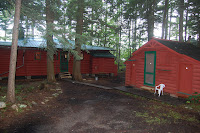

Curtis Camp from Lakefront and Backwoods


French Camp and Eagle Crag Lake from the Curtis dock
Last Tuesday J and I returned from our annual sojourn on Eagle Crag Lake, ten miles from the town of Tupper Lake in New York's Adirondack Mountains. We stay at a two-cabin compound that has been in her family for three (going on four) generations. The original "camp" (which is how folks up there refer to these places) was built in 1922-23 by Joseph Oster, stepfather of Lillian French, who with her husband Walter were the original owners of the property. At the time this was the second structure on the mile-long lake.
There was no road access, so all building materials were carried in from the raiload tracks a couple hundred yards away. One write-up on the camp's history states, "The well house behind the camp contains a 15' deep cement encasement for a wire cage to hold food for cooling. The year the hole for the cement was dug it was left incomplete until spring, and when work resumed in may, a dead bear cub was found at the bottom of the hole."
Around 1983, the family bought the adjacent camp (built in 1932) from its original owner, Steve Curtis. This expansion allowed J's parents to stay there through the summer, with the French Camp available for the succession of more temporary family vacationers.
Our annual visit provides respite from the South Carolina heat and an opportunity to reconnect with J's brothers and sister, along with their families, who come and go while we're there. When we're lucky, one or both of our daughters are able to visit with their kids--as T did their year with our two granddaughters. We've also developed friends around the lake whom we look forward to seeing each year.
E.B. White's essay, "Once More to the Lake," originally published in 1941, tells how when he was young his family spent each August at a lake in Maine. When he had a son of his own, he decided to recapture the experience, taking him to the same lake. White's recollection is filled with hardwon nostalgia. He writes, "We had a good week at the camp. The bass were biting well and the sun shone endlessly, day after day. We would be tired at night and lie down in the accumulated heat of the little bedrooms after the long hot day and the breeze would stir almost imperceptibly outside and the smell of the swampt drift in through the rusty screens."
He concludes with a memorable paragraph that I think of each time I make my initial entry into the frigid Eagle Crag Lake water, cold enough to take my breath away:
When the others went swimming my son said he was going in too. He pulled his dripping trunks from the line where they had hung all through the shower, and wrung them out. Languidly, and with no thought of going in, I watched him, his hard little body, skinny and bare, saw him wince slightly as he pulled up around his vitals the small, soggy, icy garment. As he buckled the swollen belt, suddenly my groin felt the chill of death.The back of cover of One Man's Meat, where the essay was collected, pictures E.B. White walking along balancing on a rail line. It looks much like the now unused line that runs near the family camps, a reminder of a time when it was the only access to that remote location.
No comments:
Post a Comment